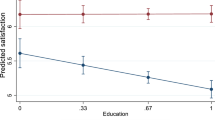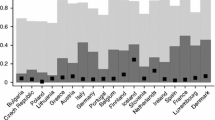Abstract.
This paper examines the determinants of intended electoral participation. We analyze attitudes to both referenda and voting in national elections. Sample survey data are obtained from the Eurobarometer survey of transition countries in Central and Eastern Europe. The empirical results suggest that intended electoral participation increases with age, income and education. But attitudinal variables are also important and in particular confidence in the free market economy and satisfaction with the general development of the country impact positively on intended electoral participation.
Similar content being viewed by others
Author information
Authors and Affiliations
Corresponding author
Additional information
Received: Received: April 2003 / Accepted: August 2004, Accepted: Received: April 2003 / Accepted: August 2004,
JEL Classification:
H26, K42
We gratefully acknowledge the financial support of CERGE-EI. We are also grateful for the helpful comments of three anonymous referees, the journal editor and R. Filer and L. Squires.
Rights and permissions
About this article
Cite this article
Orviska, M., Caplanova, A. & Hudson, J. Intended electoral participation in transition countries. Economics of Governance 6, 211–228 (2005). https://doi.org/10.1007/s10101-004-0079-5
Issue Date:
DOI: https://doi.org/10.1007/s10101-004-0079-5




